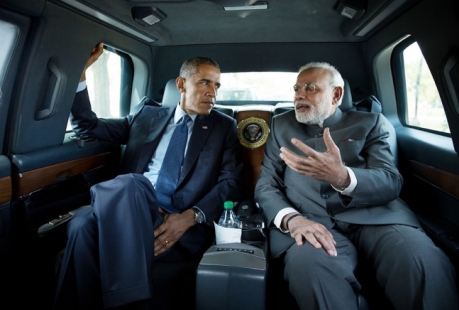The USA and India have established an inter-agency Contact Group to sort out outstanding liability and technical issues to accelerate the full implementation of the US-India civil nuclear cooperation agreement introduced in 2005.
 |
| Obama and Modi in Washington DC on 30 September (Image: the White House) |
Concluded between the previous Manmohan Singh government and the George W. Bush administration, the Indo-US nuclear deal has been stalled because of issues relating to liability laws.
But at their first bilateral summit, held on 30 September, Indian Prime Minister Narendra Modi and US President Barack Obama "reaffirmed their commitment" to the agreement.
In a joint statement, the two leaders said they had "established a Contact Group on advancing the implementation of civil nuclear energy cooperation in order to realize early their shared goal of delivering electricity from US-built nuclear power plants in India."
They said they "looked forward to advancing the dialogue" to discuss all implementation issues, "including but not limited to" administrative issues, liability, technical issues, and licensing to facilitate the establishment of nuclear parks, including power plants with Westinghouse and GE-Hitachi technology.
As a critical step in strengthening global non-proliferation and export control regimes, Obama and Modi committed to continue work towards India's phased entry into the Nuclear Suppliers Group (NSG), the Missile Technology Control Regime (MTCR), the Wassenaar Arrangement and the Australia Group. Obama affirmed that India meets MTCR requirements and is ready for membership in the NSG. He supported India's early application and eventual membership in all four regimes.
"As active participants in the Nuclear Security Summit process, the United States and India welcomed progress toward reducing the risk of terrorists acquiring nuclear weapons or related materials, and noted their shared commitment to improving nuclear security nationally and globally," according to the statement.
They reviewed their bilateral dialogue on nuclear security and endorsed working through India's Global Centre for Nuclear Energy Partnership to reinforce safe and secure use of nuclear energy worldwide. They also pledged to strengthen their efforts to forge a partnership to lead global efforts for non-proliferation of weapons of mass destruction, to reduce the salience of nuclear weapons in international affairs, and to promote universal, verifiable, and non-discriminatory global nuclear disarmament.
They stressed the need for diplomacy to resolve the serious concerns of the international community regarding Iran's nuclear program, and called on Iran to comply with its UN Security Council-imposed obligations and to cooperate fully with the International Atomic Energy Agency (IAEA).
The two leaders expressed concerns over the continued development by North Korea of its nuclear weapons and ballistic missile programs, including its uranium enrichment activities. They urged North Korea to take concrete actions toward denuclearization and other goals, as well as to comply fully with all its international obligations, including all relevant UN Security Council resolutions, and to fulfill its commitments under the 2005 Joint Statement of the Six-Party Talks.
Vikram Doraiswami, joint secretary (Americas) in India's Ministry of External Affairs reportedly said the Contact Group will resolve the outstanding issues relating to nuclear trade between the two countries.
"We are setting up an inter-agency Contact Group to be able to resolve all issues that are outstanding and hindering the rapid deployment of US-origin nuclear reactors in India, that includes specific mention of liability, it includes administrative issues and it includes technical issues," Doraiswami was quoted as saying during a briefing about the Modi-Obama meeting.
Researched and written
by World Nuclear News




_87299.jpg)
_52351.jpg)








